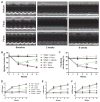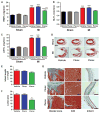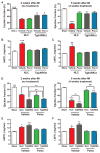Paroxetine-mediated GRK2 inhibition reverses cardiac dysfunction and remodeling after myocardial infarction
- PMID: 25739765
- PMCID: PMC4768806
- DOI: 10.1126/scitranslmed.aaa0154
Paroxetine-mediated GRK2 inhibition reverses cardiac dysfunction and remodeling after myocardial infarction
Abstract
Heart failure (HF) is a disease of epidemic proportion and is associated with exceedingly high health care costs. G protein (heterotrimeric guanine nucleotide-binding protein)-coupled receptor (GPCR) kinase 2 (GRK2), which is up-regulated in the failing human heart, appears to play a critical role in HF progression in part because enhanced GRK2 activity promotes dysfunctional adrenergic signaling and myocyte death. Recently, we found that the selective serotonin reuptake inhibitor (SSRI) paroxetine could inhibit GRK2 with selectivity over other GRKs. Wild-type mice were treated for 4 weeks with paroxetine starting at 2 weeks after myocardial infarction (MI). These mice were compared with mice treated with fluoxetine, which does not inhibit GRK2, to control for the SSRI effects of paroxetine. All mice exhibited similar left ventricular (LV) dysfunction before treatment; however, although the control and fluoxetine groups had continued degradation of function, the paroxetine group had considerably improved LV function and structure, and several hallmarks of HF were either inhibited or reversed. Use of genetically engineered mice indicated that paroxetine was working through GRK2 inhibition. The beneficial effects of paroxetine were markedly greater than those of β-blocker therapy, a current standard of care in human HF. These data demonstrate that paroxetine-mediated inhibition of GRK2 improves cardiac function after MI and represents a potential repurposing of this drug, as well as a starting point for innovative small-molecule GRK2 inhibitor development.
Copyright © 2015, American Association for the Advancement of Science.
Conflict of interest statement
Figures








Similar articles
-
Pharmacological and Activated Fibroblast Targeting of Gβγ-GRK2 After Myocardial Ischemia Attenuates Heart Failure Progression.J Am Coll Cardiol. 2017 Aug 22;70(8):958-971. doi: 10.1016/j.jacc.2017.06.049. J Am Coll Cardiol. 2017. PMID: 28818206 Free PMC article.
-
Paroxetine is a direct inhibitor of g protein-coupled receptor kinase 2 and increases myocardial contractility.ACS Chem Biol. 2012 Nov 16;7(11):1830-9. doi: 10.1021/cb3003013. Epub 2012 Aug 21. ACS Chem Biol. 2012. PMID: 22882301 Free PMC article.
-
GRK2 inhibition in heart failure: something old, something new.Curr Pharm Des. 2012;18(2):186-91. doi: 10.2174/138161212799040510. Curr Pharm Des. 2012. PMID: 22229578 Review.
-
Potential cardioprotective effect of paroxetine against ventricular remodeling in an animal model of myocardial infarction: a comparative study.BMC Pharmacol Toxicol. 2024 Dec 18;25(1):99. doi: 10.1186/s40360-024-00824-9. BMC Pharmacol Toxicol. 2024. PMID: 39696491 Free PMC article.
-
GRK2 in the heart: a GPCR kinase and beyond.Antioxid Redox Signal. 2014 Nov 10;21(14):2032-43. doi: 10.1089/ars.2014.5876. Epub 2014 May 13. Antioxid Redox Signal. 2014. PMID: 24702056 Free PMC article. Review.
Cited by
-
Cardioprotective Effects of the GRK2 Inhibitor Paroxetine on Isoproterenol-Induced Cardiac Remodeling by Modulating NF-κB Mediated Prohypertrophic and Profibrotic Gene Expression.Int J Mol Sci. 2023 Dec 8;24(24):17270. doi: 10.3390/ijms242417270. Int J Mol Sci. 2023. PMID: 38139099 Free PMC article.
-
The novel role of ER protein TXNDC5 in the pathogenesis of organ fibrosis: mechanistic insights and therapeutic implications.J Biomed Sci. 2022 Sep 2;29(1):63. doi: 10.1186/s12929-022-00850-x. J Biomed Sci. 2022. PMID: 36050716 Free PMC article. Review.
-
Management of depression after myocardial infarction.Curr Cardiol Rep. 2015 Oct;17(10):80. doi: 10.1007/s11886-015-0634-4. Curr Cardiol Rep. 2015. PMID: 26277362 Review.
-
Paroxetine alleviates T lymphocyte activation and infiltration to joints of collagen-induced arthritis.Sci Rep. 2017 Mar 28;7:45364. doi: 10.1038/srep45364. Sci Rep. 2017. PMID: 28349925 Free PMC article.
-
Impact of paroxetine on proximal β-adrenergic receptor signaling.Cell Signal. 2017 Oct;38:127-133. doi: 10.1016/j.cellsig.2017.07.006. Epub 2017 Jul 12. Cell Signal. 2017. PMID: 28711716 Free PMC article.
References
-
- Bristow MR, Ginsburg R, Minobe W, Cubicciotti RS, Sageman WS, Lurie K, Billingham ME, Harrison DC, Stinson EB. Decreased catecholamine sensitivity and β-adrenergic-receptor density in failing human hearts. N Engl J Med. 1982;307:205–211. - PubMed
-
- Claing A, Laporte SA, Caron MG, Lefkowitz RJ. Endocytosis of G protein-coupled receptors: Roles of G protein-coupled receptor kinases and β-arrestin proteins. Prog Neurobiol. 2002;66:61–79. - PubMed
-
- Rockman HA, Koch WJ, Lefkowitz RJ. Seven-transmembrane-spanning receptors and heart function. Nature. 2002;415:206–212. - PubMed
Publication types
MeSH terms
Substances
Grants and funding
LinkOut - more resources
Full Text Sources
Other Literature Sources
Medical
Research Materials
Miscellaneous

